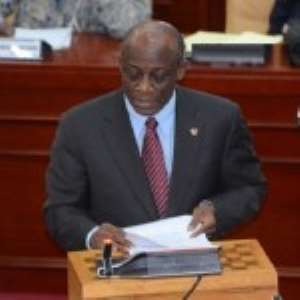
Members of the business community and industry players have rubbished the contention of the Finance Minister, Seth Terkper’s that the economy management is on track and therefore propelling growth of the various sectors of the economy.
The Industrial and Commercial Union (ICU), Association of Ghana Industries (AGI) and Ghana Union of Traders Association (GUTA) have all cried foul against the state of economic management in the country.
They have all claimed that, the state of economy is rather collapsing their businesses and industries.
They complained that, high interest and inflation rates, high taxation, unpredictable forex exchange rate, unstable power supply and unfavourable market competition due to flooding of the market with relative cheaper competitive imported products and unavailability of raw materials.
The AGI in their recent report, recorded a lower confidence in doing business in the country.
Also, the Industrial and Commercial Union (ICU) have on number of occasion revealed that some members of the Union are relocating to neighboring countries due to unfavorable business environment.
In his most recent comments, General Secretary of the Union, Mr. Solomon Kotei threatened that plans are underway to meet parliament, after which the leadership will go to court to reverse the imposition of the 27% petroleum tax which took effect January this year.
“We will get back to the Speaker of Parliament to notify him on the issue. If it was an error it will be addressed because we were told parliament gave government the authority to increase it by only 5 percent”, he said.
Additionally, Eleazer Nyaunu, the Tema Regional Officer of the Industrial and Commercial Union (ICU), reiterated that more of its members are relocating to neighbouring countries, such as Ivory Coast and Benin as result of the high operational cost in the country.
“If we are saying that the economy is not on a sound footing and businessmen are moving to neighbouring country, it is not only physical but they are moving resources and that is very real. I can confidently tell you that resources are being shifted beyond the shores of Ghana,” he pointed out.
He called on government to put proper measures in place to boost Ghana’s business environment in order to prevent companies from relocating to other countries in the sub-region, adding that Ivory Coast, which came out of civil war recently, has been able to grow its economy by 8.6 percent through the creation of a conducive business environment for all industries.
Similarly, GUTA, which recently embarked on a nationwide strike to demonstrate their dismay of the high taxation due to the introduction of new taxes which has risen their cost of doing business, has also over and over again complained to government to introduce alternative economic policies that are businesses friendly and promote entrepreneurship.
However, in a more contentious assertion, the Finance Minister, last week gave an optimistic assessment of the present and futuristic state of the economy, stating that it is on track.
He said the economy was making progress and that the government was determined to maintain continued fiscal discipline.
Terkper vowed to go to every length to control spending, despite the coming general election.
Speaking at a day’s seminar organized by the ministry for members of the National House of Chiefs in Kumasi, to acquaint them to the current state of the economy.
Mr. Terkper said the government would stick to the International Monetary Fund (IMF) programme to keep to the path of sustainable economic growth.
He, however, indicated that the borrowing would continue, “the government would take loans to support the implementation of critical infrastructure development.”
He informed the House that strong strides were being made towards addressing challenges in the energy sector.
Also, on the agricultural sector which has been the largest contributor to the economic growth (GDP) of the country for decades, Terkper said the sector would continue to grow at an average of six per cent annually, coupled with resource allocation of about 10 per cent in line with its Medium Term Strategic Plan.
He said in view of the policy, the sector had seen an average growth rate of 4.3 per cent over the last six years with the exception of the fisheries sub-sector.
In relation to expenditure, Mr Terkper said the total government expenditure to the sector had consistently increased since 2007 and government was committed to providing support to unleash the full potential of the sector.




 Meta releases new version of conversational AI across its platforms
Meta releases new version of conversational AI across its platforms
 Cape Town named Africa’s Best Airport 2024 by Skytrax
Cape Town named Africa’s Best Airport 2024 by Skytrax
 Bono East: Four injured after hearse transporting corpse crashes into a truck
Bono East: Four injured after hearse transporting corpse crashes into a truck
 ‘Be courageous, find your voice to defend our democracy’ — Sam Jonah urges journ...
‘Be courageous, find your voice to defend our democracy’ — Sam Jonah urges journ...
 Exodus of doctors, nurses and teachers have worsened because of unserious Akufo-...
Exodus of doctors, nurses and teachers have worsened because of unserious Akufo-...
 2024 election: Avoid insults, cutting down people in search of power – National ...
2024 election: Avoid insults, cutting down people in search of power – National ...
 ‘You passed through the back door but congratulations’ — Atubiga on Prof Jane Na...
‘You passed through the back door but congratulations’ — Atubiga on Prof Jane Na...
 Government’s $21.1 billion added to the stock of public debt has been spent judi...
Government’s $21.1 billion added to the stock of public debt has been spent judi...
 Akufo-Addo will soon relocate Mahama’s Ridge Hospital to Kumasi for recommission...
Akufo-Addo will soon relocate Mahama’s Ridge Hospital to Kumasi for recommission...
 We must not compromise on our defence of national interest; this is the time to ...
We must not compromise on our defence of national interest; this is the time to ...
